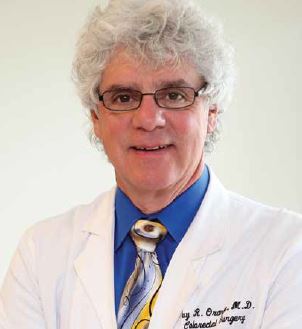Guy R. Orangio, MD
In September 2012, the LSU Health System welcomed its first colorectal surgeon, Dr. Guy Orangio. One of only 1200 colorectal surgeons in the U.S., Dr. Orangio treats colon, rectal and anal cancer, as well as inflammatory bowel disease, severe constipation, fecal incontinence and fistulas.
 What brought you to New Orleans?
What brought you to New Orleans?
I had been in private practice in Atlanta for over twenty years when LSU offered me the opportunity to develop a section of colon and rectal surgery, in addition to teaching medical students and residents. I made the decision to come to New Orleans and have so far been thrilled with the city. The people are amazing and I love being able to walk almost anywhere.
What does an average day look like for you?
For me, every day is a mix of seeing patients, performing endoscopy and doing surgeries at the hospital.
How did you decide to become a colorectal surgeon?
During the third and fourth years of my residency at Long Island Jewish Hospital, I had the opportunity to work with colorectal surgeons who had a profound influence on me. In terms of my sub-specialty, it was the variety that appealed to me. It encompasses endoscopy as well treating minor anal/rectal diseases like hemorrhoids and fistulas and performing complex major abdominal procedures.
Who are your patients?
Most of my cancer patients are above the age of 50. My patients with inflammatory bowel disease are in their teens and twenties and my hemorrhoid patients are all ages as hemorrhoids can strike at any time in a patient’s life.
What are your most challenging surgical cases?
I am most challenged by cancers of the rectum because the treatment approach must be multidisciplinary. I work together with a radiation oncologist and a medical oncologist, and I’m involved with these cases throughout the disease process, from diagnosis to treatment to recovery.
Additionally, patients undergoing rectal surgery would obviously like to maintain normal bowel function, so my challenge is to salvage that function but still remove their cancer.
What recent medical advance has changed the way you practice medicine?
Minimally invasive laparoscopic surgery allows me to perform the same cancer operations using small incisions as opposed to the open surgeries of earlier years. The benefits to the patient are decreased pain, shorter hospital stay, quicker return of bowel function, faster recovery and a decreased number of wound infections.
Previously, a patient would need to stay in the hospital for 10-12 days after having a left-sided colon cancer removed. With the new minimally invasive surgical techniques, that stay has been reduced to 4.7 days on average and the patient can return to work two to three weeks after the surgery.
When I first went into practice, no one in my field was using laparoscopy. In early 90s I was one of the first surgeons to use laparoscopy for colon and rectal surgeries. I’ve had the advantage of using this technology throughout its evolution.
What do you like most about your job?
Everything—I love the procedures I perform, I love teaching residents, but most of all I love interacting with my patients. I enjoy explaining the disease process, the treatment plan, the goals, the role their participation plays and how we need to work together. I can gain so much from simply listening to my patients. I make sure they know that regardless of whether they suffer from a minor or major problem, I am available to them during and after treatment.
ADDRESS:
3700 St. Charles Ave, 5th Floor
New Orleans, LA
PHONE:
(504) 412-1310
SPECIALTIES:
Colon and Rectal Surgery
RESIDENCY:
General Surgery, Long Island Jewish Hospital
FELLOWSHIP:
Colon and Rectal Surgery, Cleveland Clinic Foundation in Ohio
BOARD CERTIFICATIONS:
General Surgery
Colon and Rectal Surgery
PHILOSOPHY:
“The most important thing is to interact with patients and to listen to them. They’ll tell you what’s wrong. They guide you through.”
